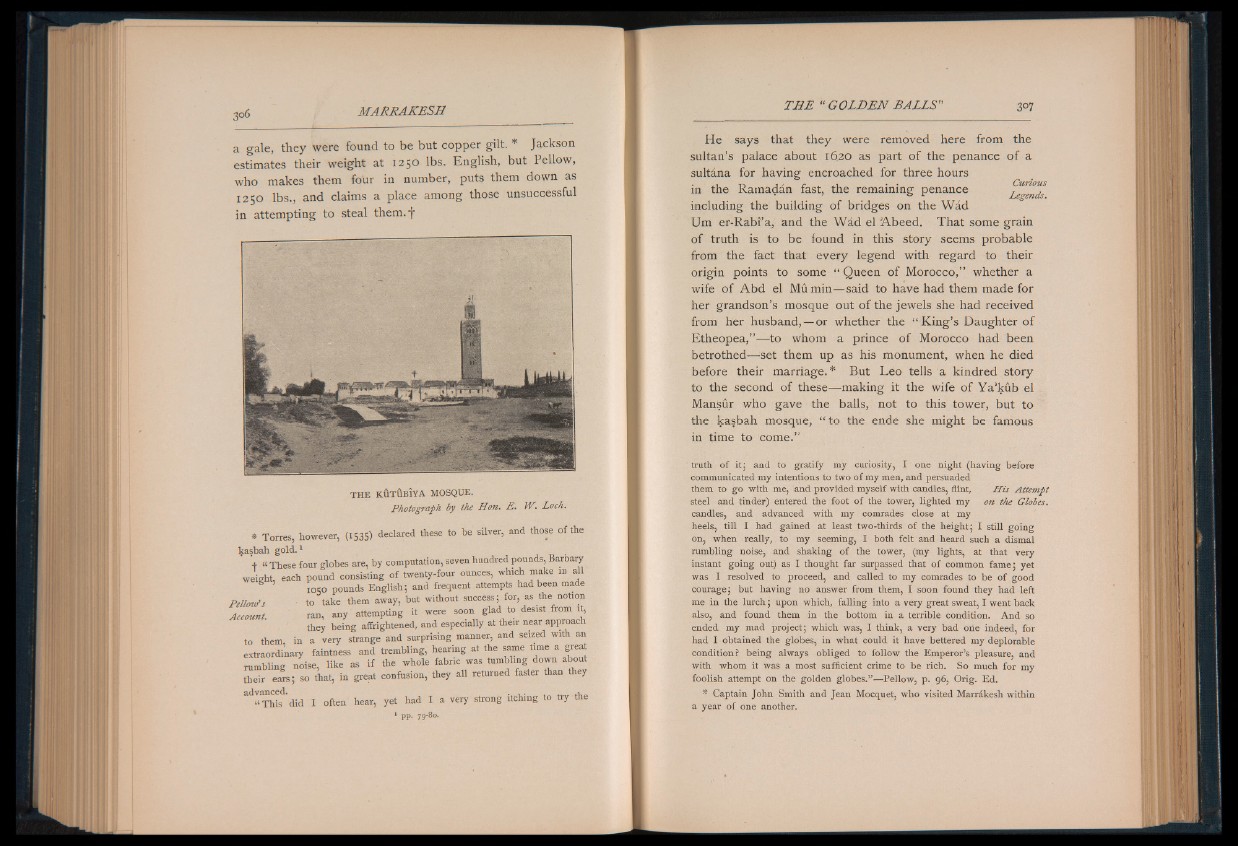
a gale, they were found to be but copper gilt. * Jackson
estimates their weight at 1250 lbs. English, but Pellow,
who makes them four in number, puts them down as
1250 lbs., and claims a place among those unsuccessful
in attempting to steal them.f
* Torres, however, (1535) declared these to be silver, and those of the
Irasbah gold.1
+ “ These four globes are, by computation, seven hundred pounds, Barbary
weight, each pound consisting of twenty-four ounces, which make in all
1050 pounds English; and frequent attempts had been made
Wow's to take them away, but without success; for, as the notion
Account. ran, any attempting it were soon glad to desist from it,
they being affrightened, and especially at their near approach
to them, in a very strange and surprising manner, and seized with an
extraordinary faintness and trembling, hearing at the same time a grea
rumbling noise, like as if the whole fabric was tumbling down about
their ears; so that, in great confusion, they all returoed faster than they
^ « T h is did I often hear, yet had I a very strong itching to try the
He says that they were removed here from the
sultan’s palace about 1620 as part of the penance o f a
sultana for having encroached for three hours
in the Ramadan fast, the remaining penance
including the building of bridges on the Wad
Um er-Rabi’a, and the Wad el Abeed. That some grain
of truth is to be found in this story seems probable
from the fact that every legend with regard to their
origin points to some “ Queen of Morocco,” whether a
wife of Abd el Mu min— said to have had them made for
her grandson’s mosque out of the jewels she had received
from her husband,— or whether the “ King’s Daughter of
Etheopea,”—^to whom a prince of Morocco had been
betrothed—set them up as his monument, when he died
before their marriage.* But Leo tells a kindred story
to the second of these— making it the wife of Y a ’kub el
Mansur who gave the balls, not to this tower, but to
the kasbah mosque, “ to the ende she might be famous
in time to come.”
truth of it; aad to gratify my curiosity, I one night (having before
communicated my intentions to two of my men, and persuaded
them to go with me, and provided myself with candles, flint, His Attempt
steel and tinder) entered the foot of the tower, lighted my on the Globes.
candles, and advanced with my comrades close at my
heels, till I had gained at least two-thirds of the height; I still going
on, when really, to my seeming, I both felt and heard such a dismal
rumbling noise, and shaking of the tower, (my lights, at that very
instant going out) as I thought far surpassed that of common fame; yet
was I resolved to proceed, and called to my comrades to be of good
courage; but having no answer from them, I soon found they had left
me in the lurch; upon which, falling into a very great sweat, I went back
also, and found them in the bottom in a terrible condition. And so
ended my mad project; which was, I think, a very bad one indeed, for
had X obtained the globes, in what could it have bettered my deplorable
condition? being always obliged to follow the Emperor’s pleasure, and
with whom it was a most sufficient crime to be rich. So much for my
foolish attempt on the golden globes.”—Pellow, p. 96, Orig. Ed.
* Captain John Smith and Jean Mocquet, who visited Marrakesh within
a year of one another.